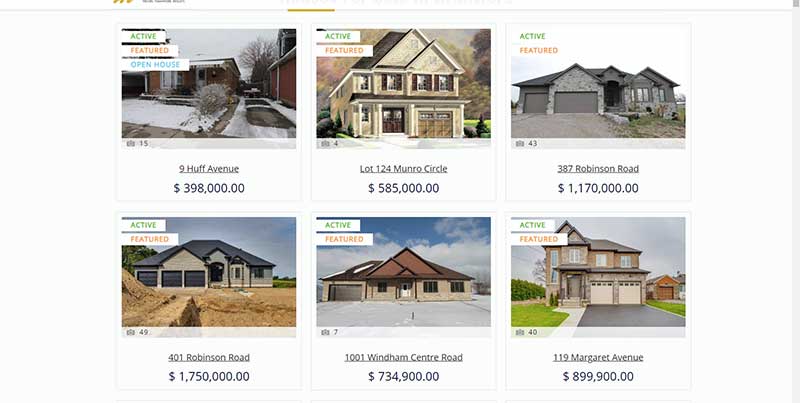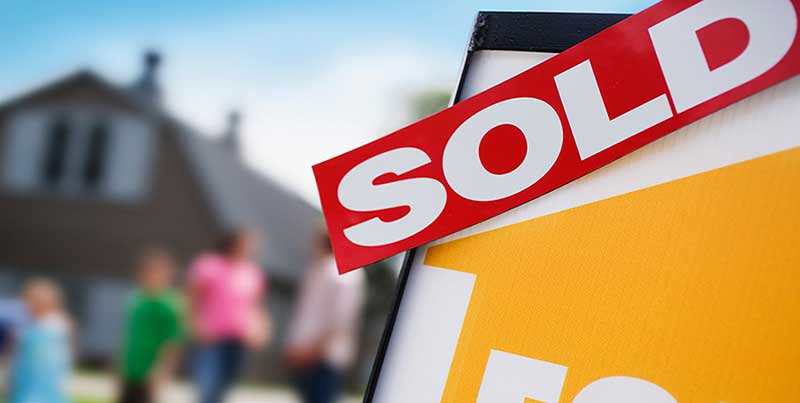
What to Do If Your House Isn’t Selling?
You finally made the decision to sell your house and got it listed – congratulations! Unfortunately, you’ve also discovered that the process isn’t as easy as you thought it would be because your house has been sitting on the market, showing but not selling. It’s been more than a month and you’re asking yourself “Why isn’t my house selling?” Hopefully you’ve realized something has to give and you’re thinking it might be time to adjust your strategy. That’s exactly why we’ve created this guide to help you figure out what to do if your house isn’t selling.
House Not Selling? Don’t Panic!
As realtors we know that this kind of scenario can be frustrating for home sellers, if not a little frightening. Your home is a major part of your life, financially and otherwise, meaning you had a plan of action before you listed it for sale. That plan included a schedule with deadlines and financial considerations – all of which are going out the window while your house isn’t selling.
Before you panic, keep in mind it’s not uncommon for homes to take longer than 30 days to sell, and every market area has a different average timeframe in this regard. So while you shouldn’t worry, you’re absolutely correct to think you might need to adjust your strategy so you can get your house sold.
It’s not just costing time, it could be devaluing your home
Buying and selling real estate has changed over the years, meaning that home buyers have become much more informed and savvier in the way they approach the process. Market research and finding specific information about a property has become much easier, and there’s also a lot of choice around. This is one of the reasons that a home can end up becoming perceived as “less desirable” if it sits on the market for too long. Buyers can become skeptical of houses that don’t sell quickly because they wonder what’s wrong with it that it hasn’t sold. As a seller, you’d prefer a quick sale because not only will your home typically fetch its top dollar in sales value during the first month, while an extended process often ends up costing money as well as your peace of mind.
However, keep in mind that it’s not all doom and gloom. Just because your home isn’t selling, that doesn’t mean you’re going to lose your shirt. There’s lots of possible reasons your home isn’t selling, which means there’s lots of changes you can make to help bring the buyers to your door again.
Keep reading for our list of what to do if your house isn’t selling.

Your asking price is too high
Ask any real estate agent and they’ll tell you, “One of the most difficult aspects of selling, but also the most important is setting a correct asking price for a client’s home.”
Obviously, you want the most money for your home that you can but remember that you need to figure out what buyers are willing to pay or your house won’t sell. Pricing your home too high is probably the most common mistake people make when they go to sell. There’s lots of data that can help determine what the fair market value for your home is, but it’s still a tricky decision regardless. The optimal asking price for your home is also always fluctuating with the local (and wider) real estate market.
What’s the solution?
When choosing a selling price, one of the most important criteria to look at is what similar homes in your area are selling for. This information is a great indicator of what your property is worth and how much you should ask. You can easily look at online listings to get a ballpark idea of what your home is worth, but when it comes down to determining the final asking price, we always recommend hiring a professional realtor. Realtors know the local area and market, which means nobody is in a better position to help you get the most value for your home. From listing correctly, to marketing your house successfully a real estate agent can make all the difference.
“We make it one of our priorities to correctly price a home so that it ideally sells within a month.”
It’s also important to pay attention to what buyers are saying as they view your home during open houses or via online listings. Usually buyers will give feedback about buying factors like price, or what your home does (or doesn’t) deliver at that price point. This information is gold if you need to adjust your asking price.
- Don’t price your house too high in relation to the competition.
- Use a realtor to determine your ideal price point.
- Do your own research into what other homes in your market are selling for.
- Stay involved in the process and begin to think about making pricing changes around the 3-week mark if there have been no suitable offers for your property.
- Don’t be reluctant to adjust or lower your price if your home isn’t selling.

Your home staging is lacking
Don’t listen to those who say home staging doesn’t matter, believe us, we’ve heard it before, “It’s the house buyers pay for, not the contents within,” or something along those lines. Getting value for your house is more complicated than that. Buyers are people (of course) and that means emotions will play a role in any purchase decision, a larger role than you’d think. Data suggests that staged homes sell over 80% quicker than those that aren’t staged. We’ve seen it over and over again first hand, and almost every realtor will agree that home staging is an important part of getting your home sold for the best price.
Home staging matters because you want your potential buyers to be able to picture your house as a home, a place they want to live. Not only will having furniture and everything staged give your house a positive feel, staging can also be tailored to present your house in its best light. Use home staging to brighten up your home, show off that spacious living room or let buyers envision their new cozy master bedroom. Home staging isn’t just about adding furniture and stuff either. It’s also a great time to do small fixes to your home that will create a positive cosmetic perception for potential buyers.
If you aren’t staging your home, you might be missing out.
What’s the solution?
While it’s a bit of work and expense at the beginning, staging your home will pay dividends later. There are lots of ways you can do this yourself but hiring a professional home staging team is usually your best bet. Not only does a professional help keep the process hassle-free by provide the furnishings, these professionals are experts at making sure everything is set up just right so buyers viewing your home will fall in love with it.
- Declutter your home, paint the walls, stain the floors, clean up your yard – do the little fixes that can make a world of difference.
- Hire a professional home staging team to handle everything properly – your realtor will know the right team.
- Don’t be afraid to step out of your personal ‘home décor comfort zone’ because home staging isn’t about your tastes, it’s about selling your home.

Your home’s curb appeal sucks
A lot of sellers we represent are initially mostly concerned with the house itself and don’t give the rest of the property a second thought. This is a mistake because your front yard, backyard, driveway etc. play a big role in the first impression your home delivers, and you know how important that can be. Referred to as your homes ‘curb appeal’, this first impression can have a big influence on how buyers view your listing. Don’t put buyers into the ‘fixer-upper’ mindset as they walk up to your door because your frontage is unkempt. There’s a lot of subconscious thought involved in a buying decision and the gut feeling buyers get when they see your listing can really affect the transaction.
What’s the solution?
Take the time to look at your property in its entirety or from the curb and pay attention to the details. Help foster a positive first impression by making your property look well kept and inviting.
- Look at your house from the curb and imagine it as a first impression.
- Make sure your lawn is at its best – cut, watered etc.
- Plant some flowers, bushes or hedges (these can also be used to hide certain imperfections).
- Paint the front door to your house an inviting colour.
- Hire a professional or do some basic landscaping yourself.
- Consult your home staging team for ideas.

Your listing isn’t professional quality
What’s the first thing potential buyers see when they go shopping for houses? Most likely it’s the real estate listing – usually from an online source. Your listing is the first thing buyers see, which means it needs to look great and provide the impression you want.
Are your pictures well taken and presented in high definition? Is the description of your house and property doing your home justice? Is all the information accurate? To begin their home search, buyers look through online listings and create a shortlist that reflects not only their needs but also what they liked visually. Therefore, if your pictures suck, chances are buyers won’t be super excited and may not even consider visiting your house. No hastily taken iPhone photos please – we recommend using only quality photos to showcase your home in its best light.
What’s the solution?
Speak with your realtor about how your listing will be presented and ask to see some samples from other clients. Sub par photos could be a big reason your house hasn’t sold and might be why inquiries are slow to come in. If you like your real estate agent, but don’t like the listing photos, it might be worthwhile to invest in a professional real estate photographer to get the visuals done right.
- Make sure all photos are high quality and show off your home properly.
- Ensure all information on your listing is accurate.
- Create a colour flyer or postcard to distribute.
- Hire a company to shoot a virtual tour video and upload it to your listing.
- Include photos of every room in the house, with special attention given to the kitchen and bathrooms.
- Prepare your home for pictures by decluttering, setting a nice table spread or moving some furniture out to make rooms appear larger.
- Take any opportunity to advertise your home yourself.
Pay attention to feedback
Throughout the process of open houses, private showings and online listings you’ll likely be getting feedback from potential buyers. You might find that a lot of buyers think your house is over priced, that it’s too dark, too cluttered, the windows need cleaning or there is perhaps something else amiss. It’s important that you take any feedback in good nature, learn from what your buyers are saying and adapt your home or asking price to meet those needs.

Consider if it’s the right time to sell?
Of course, you can sell your house at any time of the year but take a minute to consider if ‘now’ is the perfect time to do so. If the market is in a slump you might do well to hold off on selling, similarly the winter months can be a slow time of the year, what with the cold weather and holidays keeping everyone busy. You might be better to wait for spring, when the volume of buyers is often at its highest. Timing is important, so if you aren’t faced with time constraints for a sale, it’s recommended time your sale when as many factors as possible are in your favour.
What’s the solution?
Speak with your local realtor about what they feel is the best time to sell in your region, because ‘now’ is not necessarily the right answer. Nobody knows the market better than a real estate agent and they can help you get started on the right path.

Switch real estate agents
If the sale of your home isn’t going the way you’d planned, it’s up to you to analyze and figure out what’s wrong. There are many factors but one you should not overlook is your real estate agent. While real estate agents can’t do magic, you should expect them to be busy applying themselves to sell your home. Sadly, not everyone has the same work ethic so if you feel like your best interests aren’t being taken care of, an agent switch might be your best move.
It’s also important to consider that not all real estate agents are the same. Your ideal agent should represent a full-service brokerage that is familiar with the local market, has a wide-reaching ability to market/advertise your house, and (very important) have your best interests at heart during the entire process. Then on top of those qualities, you still need to make sure that your agent is going the extra mile to get your home sold.
What’s the solution?
Selling your house is one of the most important transactions you will make in your lifetime and there’s a lot riding on a successful outcome. For these reasons, we recommend that you keep an analytical mindset when dealing with your realtor and the sale, so if you feel you are not getting the service you expect, then you need to consider switching agents. If things have stagnated in your sale, speak with your agent about why they think this has happened and get them to outline their strategic plan of action that will get your home sold. Remember, agents aren’t magicians, but they do need to put in the work to close the deal.
- Look at your agent’s track record.
- Choose a top agent in your region that operates in a full-service brokerage (marketing, advertising capabilities)
- Make sure you see eye-to-eye with your agent.
- Stay involved in the sale of your home, so you always have an overview of what’s being done to complete the sale.
- Realtors are like any other business – if the results aren’t there and the working relationship is breaking down – move on.

Keep a positive outlook – you can get your home sold!
Even if your sale is taking longer than you anticipated, it’s not too late to get your house sold. Dealing with a complicated sale is all about making the correct adjustments to your game plan. This includes adjusting the asking price, the listing, the home staging and everything else we outlined above. Remember, you can always take your home off the market, make some changes and relist when you’re ready to try again.
If you have additional questions or would like to speak with one of our knowledgeable agents about your home, please shoot us an email or give us a call – we’re happy to help!

